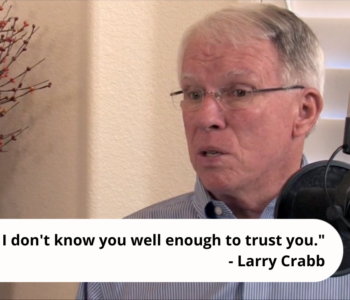 Message
Message
 Message
Message
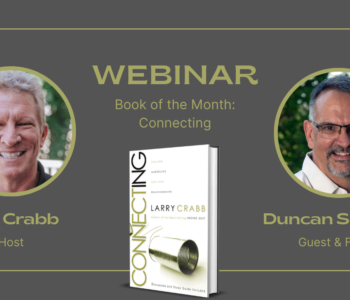 Video
Video
About the book: In his most significant book to date, Dr. Larry Crabb expands on his lifelong work in the field of psychotherapy to adopt a groundbreaking, but biblical, approach to healing the deep wounds of the soul-an approach that centers around building intimate, healing mini-communities in our lives and churches.
Dr. Crabb envisions a day when communities of God’s people-ordinary Christians whose lives connect as husband to wife, brother to sister, friend to friend-will accomplish most of the healing that we now depend on mental health professionals to provide. God has deposited within us the power to heal soul-disease and that power is released to do its work as we relate to each other in revolutionary new ways. In challenging, practical language, Dr. Crabb shows us how.
Order the book here: https://store.largerstory.com/products/connecting-healing-for-ourselves-and-our-relationships
 Blog
Blog
If connecting is what God has made us for, and if this is what the Holy Spirit equips us to do, then why don’t more of us connect with one another? Larry Crabb’s answer is developed around four analogies. We tend to be either city builders, fire lighters, wall whitewashers, or well diggers.
City builders are those who know what resources they have and how to use them. They know their strengths, and they have a solid sense of their adequacy to meet whatever lies ahead. City builders want to be in control and fear that they might be found inadequate. City builders have a hard time connecting with someone else because they are looking for affirmation of themselves, not what is good in another. They can work together with other people towards a common goal but only if it increases their sense of adequacy.
Martha Stewart, for example, has built an empire on feeding people’s desire to be adequate, able to handle any situation. She is in control of her kitchen, her house, her yard, her life. And she is the one who will show us how to bring our lives under control.
God has created us with a desire for good. We want to please others; we want to live in peace; we want to have everything work out right. And, in heaven, it will. But we are not in heaven, and too often we try to insulate ourselves from the messiness of the world around us. City builders depend on their own resources to bring a sense of control into their lives. Their adequacy comes from themselves and what they can accomplish. But this blocks them from depending on God. God encourages us to seek peace with all men (Rom. 12:18), but at the same time we must realize that following Christ is a path of difficulty, not ease (2 Tim. 3:12). We are being prepared for perfection, but we are not to expect it here on Earth. God has prepared a perfect city for us, but we are not to try to create it on our own now (Heb. 11:13-16).
Fire lighters are like those people described in Isaiah 50:10-11. They walk in darkness, but, rather than trust in God to guide them by His light, they light their own torches and set their own fires by which to see. Fire lighters, Dr. Crabb says, are those people who must have a plan they know will work. Their demand of God is the pragmatist’s “Tell me what will work!” Fire lighters trust and hold closely to their plans, so connecting is hard for them because it would require them to trust God and not know what might happen next. Connecting requires us to give up our plans and expectations so that we can recognize and enjoy God’s plans. We can either trust God or trust our own plans, but we cannot do both. It is not wrong to plan, but we must be willing to give up our plans when Jesus does not fit into them in the way that we want. As C.S. Lewis describes Aslan, the great lion who represents Jesus in The Chronicles of Narnia, it’s not as if he were a “tame Lion.”
Have you ever known people whose primary efforts in life were directed towards protecting themselves and their children from any difficulties? When safety is your top priority, then you have become a wall whitewasher, Dr. Crabb says. Wall whitewashers build flimsy walls of protection around themselves and their worlds, and then whitewash them to make them appear stronger than they really are. These people want protection from whatever they fear. They are sure that their lives of dedication to the Lord are a protection from major problems. “Wall whitewashers cannot welcome tribulations as friends. . . Character isn’t the goal of a wall whitewasher. Safety is.”(Connecting, pg 121)
Many people who feel God’s calling in their lives also assume that God will take care of them and of their families. And He will – but not always in the way that we imagine. As we raise our children and watch the terrible struggles that seem to overcome so many other young people, we may feel that at least God will protect our own children from such affliction. But if our trust is that our serving the Lord is protecting our family, then we have built up a false sense of security. We are trying to cover our own uncertainty about the future with the whitewash of our own good deeds. Through tribulations, God builds us up and shows us our need to depend on Him alone. However, we often want to hide ourselves and protect our families from the very misfortunes that God would use to strengthen us. We are whitewashing a failing wall when we try to put up a hedge around ourselves and our families, sure that God will protect us from trouble. Everything that happens in our lives has come through God first or has been “Father-filtered,” as someone once said. But we must depend on the Lord in all circumstances, not just when we feel protected. God loves us perfectly, but His desire is to give us His character, not to protect us from any difficulty. That is why, as James says, we are to greet tribulations as friends and not with fear.
Dr. Crabb’s fourth class of people who thwart God’s purpose in connecting are those he calls well diggers. The image comes from Jeremiah 2, where God marvels at the broken, pitiful wells that the Israelites make instead of coming to Him for real, unlimited water. Well diggers are looking for satisfaction on their own terms, and they want to escape pain at any cost. The well digger asks, “Do I feel fulfilled?” If the answer is no, then he renews his quest for something that will give even a moment’s pleasure.
We judge drug addicts harshly, and yet we are blind to our own need to have a certain position or to drive a certain kind of car to feel good.
Well diggers also are characterized by something that marks our whole first-world culture: the desire for satisfaction now. They dig their own wells because it often seems faster than the way God is providing water. We want to be filled, and we want it immediately. We live in a fast-everything world. We stand around the microwave oven, wondering why it takes so long to heat a cup of water. Or, more seriously, we wonder why God is taking so long to bring along the right woman or man, so we find our own ways to satisfy our desires, whether in pornography, or cheap sex, or relationships we know can’t last. We want to be satisfied, and if God seems slow, we find our own satisfaction any way we can.
God plans for eternity and builds what will last forever, but this takes time and patience. If we fulfill our own desires, we will be like the Samaritan woman at the well – we will soon thirst again. If, however, we allow God to provide for our thirst, He fills us with living water, and we are filled in ways we could never have known otherwise.
Whether we are city builders, fire lighters, wall whitewashers, or well diggers, we will never be able to deeply connect with another person until we kill these urges of the flesh and allow God to strengthen our spirit. What will help us connect with other people?
God uses desert seasons in the lives of city builders, so they can stop being driven by the fear “am I adequate?” and instead receive His message of connection: “I believe in you.” Repentant city builders find themselves freed from the need to prove their adequacy and empowered instead to ask: “What can I give?”
When darkness deepens, the power of the question “am I right?” wanes as fire lighters become aware of their yearning to trust God. The pressure to be right gives way to the new question: “Whom do I trust?”
When dreams shatter and hardships come that cannot be avoided, wall whitewashers have the opportunity to let go of the question “am I safe?” Instead, a new awareness of God-planted courage is released as a repentant wall whitewasher embraces a new question: “Am I in good enough hands to aggressively move into life?”
Repentance for well diggers occurs when they face the impact their selfish demand for personal fulfillment has had in harming others. Only then can a humble gratitude for forgiveness fuel the new question “how can I bless?” in their hearts.
Regardless of which sinful tactics we are most prone to use, as the Holy Spirit exposes our methods of seeking life on our own terms and we repent of the way this impacts our relationship with God and others, our hearts can open to new levels of trust and connection. Instead of using others for our own needs, we can offer other-centered love and care. The life of Jesus is released through us as we turn away from the old ways of making life work on our own terms, and we are freed to bring joy to our heavenly Father and blessing to those around us.
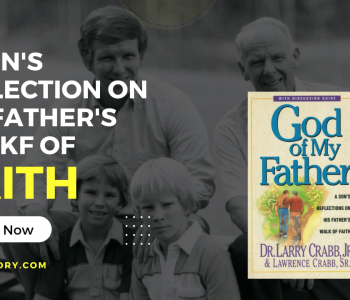 Message
Message
 Video
Video
In God of My Father, Dr. Larry Crabb shared with us his personal spiritual mentor, a man strong in faith and steady in his walk. That man was his own father, Lawrence Crabb, Sr.
This book is about mentoring: how an older person influences a younger person for good. Even more, this is an intensely personal story of one man’s walk with God as he wrestled with life, and a moving tribute to the influence of a godly mentor and faithful father, displaying God’s abiding faithfulness to generation after generation of his children.
Order the book here: https://store.largerstory.com/products/god-of-my-father
 Blog
Blog
As I sit here, in honor of Father’s Day, reminiscing on my memories with my grandfather, Dr. Larry Crabb, I can’t help but smile. He truly is a man whose life is worthy of emulating. I do not say that lightly. Pop displayed Christ to others through his decisions and relationality in a way that few Christians are capable of. Pop was a righteous believer and an honorable mentor. Despite all the hardships he faced, his love for the Lord and others never wavered. However, at times, his faith did. That’s the tricky thing about faith, it is a deep conviction that something is the truth without definitive evidence.
His faith in God’s larger story was built upon a solid foundation. To build this foundation, it requires a deep degree of contemplation and prayer. First and foremost, he had to refute all preconceived ideas and question everything. This meant giving up Christianity for a period to evaluate his beliefs. He refused to be a Christian for any other reason than him truly believing it as the way, the truth, and the life. This is not an easy thing to do. It requires serious research in pursuit of the truth. Pop explained that shortly after his undergraduate, he sent a letter to his father explaining he was giving up Christianity. Pop was obviously anxious for his father’s reply. When he finally received his father’s letter, it read, “Glad you’re thinking.”
Pop vocalized that he wished the same thing for me. He wanted me to be sure in my beliefs. This was the best advice I could have received and how I intend to approach Christianity with my future children. Being raised in a Christian household is a huge blessing; however, it can also lead to complacency in our relationship with God. We can become stagnant in our prayer and lose touch of why we became Christians. It can lead to relying less on faith and more on our families’ beliefs. Therefore, Pop urged me, and I will urge my children to think for themselves. The doubt we all wrestle with is not a bad thing. As Pop demonstrated, we can use this doubt as a tool to strengthen our faith and draw nearer to God. Even from an early age I remember how fortunate I felt to be a member of the Crabb family with Larry as our Patriarch. I can only imagine what he’s seeing right now. Happy Father’s Day, Pop.
By Jake Crabb
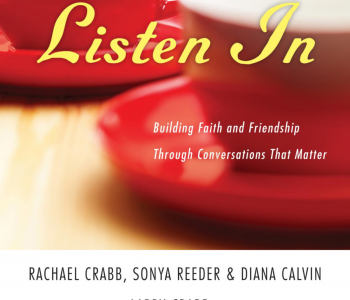 Message
Message
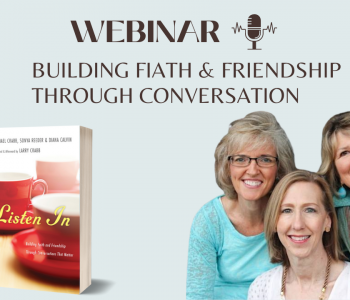 Video
Video
We all know how discouraging it can be to share our story with someone who’s not really listening. Being engaged in a conversation, just like friendship, is about so much more than simply talking. How can we use words to connect with each other in ways that can do deep and lasting good? How do we have conversations that matter?
In these pages Rachael Crabb and two of her friends in ministry, Sonya Reeder & Diana Calvin, take up this question in a creative and informative way, providing model dialogues with one another exploring the deep issues of their lives. You will be intrigued and informed by learning from their journeys, but most importantly you will learn how you can start similar conversations with your friends. Reflection and discussion questions provide a guide for you to think about how the themes of these chapters relate to the themes of your own life journey. This makes an ideal book for small groups of women as well as for triads or pairs to read and discuss together. Along the way you will learn new listening skills as well as learning about yourself and your friends. Come along and listen in.
Order the book here: https://store.largerstory.com/products/listen-in-building-faith-and-friendship-through-conversations-that-matter
 Blog
Blog
I bought some shoes recently because I just loved them so much. They were also kinda painful to wear when I put them on the first time. I wore them to meet a boy, and I could barely walk. Halfway through our time together, I kicked them off and put on my Uggs, which is short for “Ugly.” The second time I wore them, it was to meet another boy, and they felt a lot better. I was able to wear them much longer and walk a little better. It took some time to get comfortable, but I loved the shoes, so maybe it was worth some discomfort at first?!
I think my uncomfortable shoes are a lot like my longings. If my longings are uncomfortable, I’d rather ditch them and not look at them to be reminded of what hurts. I’ve tried that for years, and, you know what, it also means I have to ignore a significant part of my heart – the very place God wants to engage with me – that tender sacred space that feels vulnerable and exposed.
I’ve tried killing it, numbing out, justifying it away, making excuses, and various other coping mechanisms, but nothing comes from it except half-hearted living and only offering to others what feels safe and comfortable. This is a way to live, but not a very good one.
Our longings tell us something matters.
My spiritual director reminded me that our longings can be disordered when we only focus on the desired outcome. The invitation – dare I say it, GIFT – is to engage with the Lord in the process of the discomfort, especially when we want to discard our longing like a sweater or pair of shoes that need some time to get broken in.
My spiritual director who also sees many other single women said, “There’s an acute pain that you live with. Remaining present means remaining with the longing.”
I felt seen.
Our longings are more than one thing. They are multidimensional, just like any other human, but today I want you to know I see you and am with you in it. As a big sister to many of you on here, let’s keep encouraging one another to risk, long, remain open, face rejection with tenderness, and engage honestly with the Father. Our longings here are but a tiny snapshot of something bigger.
By Beth Wayland